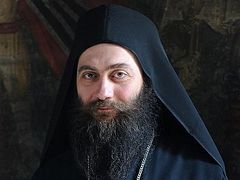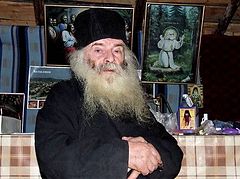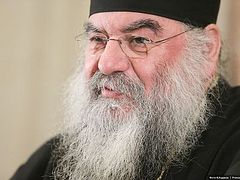Here on Cyprus, they don’t call him “Your Eminence,” or “Metropolitan,” but “Elder.” Vladyka’s spirit is quiet and joyful. On Bright Monday he served in the Monastery of St. George the Alaman: He walked through the church unnoticed, stood in his spot, sang the Paschal canon, went into the altar, served the Liturgy, blessed everyone, drank some coffee in the guest house with the people, and left, just as imperceptibly. On Monday after St. Thomas Sunday, he was at the Monastery of St. Heraclides early in the morning to confess the sisters, then children and parishioners went to him. I also approached the elder. I had many questions in my head about how to live the spiritual life in a metropolis, but I quickly realized that for every question, he had one simple answer: “Love Christ.”
We present this informal conversation without editing in order to show Metropolitan Athanasius’ everyday style of communication.
 Metropolitan Athanasius of Limassol
Metropolitan Athanasius of Limassol
It’s not important where you live, but how!
—Thank you, Elder, that you embrace not only your spiritual children on Cyprus with your love, but also us Russians. We love you very much!
—For me there are no Russians or Cypriots; we are all brothers.
—Life is fast-paced in Moscow; we’re all running around, and even the Church is just part of our schedule. We get little for the soul. Your children in the world live a true spiritual life. They say that you brought the spirit of Athonite eldership to the island and by it you renewed the monasteries of Machairas, of St. Heraclides, and of Mesopotamos, and you attracted students by it when you began to converse with them about fifteen years ago at the university. What experience did you bring from the Holy Mountain?
—My child, I did not do anything special. The Lord doles out His work. We are worthless servants; we have done nothing useful. You don’t have to talk about what you do out loud. God can do everything without us. The Athonite fathers, the saints of our days, saw no difference in where a man lives, but in how he lives.
It’s not important whether I live on the Holy Mountain, in Russia, Cyprus, or America. It’s important how I live! I can live carelessly on the Holy Mountain too! And not succeed. Or I can live in New York and become a saint, or live in Moscow and become a saint. I can live in Machairas Monastery[1] and remain a sinner. Lifestyle and the Church matter. It is the ark of salvation. The Holy Mountain is so precious because it belongs to the Church. Monasteries are precious because they are part of the Church. The Church saves us. Wherever the Orthodox Church is, there are the holy Sacraments; wherever there are Christian podvigs and spiritual fathers who help us to live the spiritual life, there is the salvation of man.
The Church is the ark of salvation. Not a monastery. Not the Holy Mountain. Not the desert. The Church! The Church saves the desert and the city. The Church saves every person.
In fact, there is no difference between a monk and a layman. Externally, yes, there is, but it is only external. A monk and a married person have different living conditions, but in fact their path is one, because Christ desires our heart—both the heart of a monk and the heart of a layman; both the cleric and the simple person; both the married and the unmarried. All of them have to love Christ. Whoever loves Christ is betrothed to Him in his heart. It doesn’t matter where he is or who he is. Of course, it’s easier for monks—they have silence, obedience, freedom from cares…
—The services, prayer…
—The services, prayer—and this is a great help. But the Church gives the holy Sacraments to everyone and saves them. The Church saves us—not a place or the conditions of our life.
Did not Christ say to us: “Rejoice”?
—You and your spiritual children always amaze with me your quiet and joyful spirit. Where does it come from?
—From Christ [laughs]. Did not Christ say to us: “Rejoice always!”? “Rejoice,” he said to the Myrrh-bearers when He had resurrected. Rejoice! Christ is joy, inner peace, love. If we didn't feel joy and peace with Christ, then who would ever be joyful?
—But not all Christians are joyful!
—I don’t know if it’s all or not. But how could we not be joyful? Joy, my child, is the presence of Christ in a man. Therefore, we should be full of joy and praise for God and thank Christ for His love and His presence in our lives.
—Can there really be a “must” here? Love is always natural and comes from the heart of man!
—Life with Christ and the Church does just that! We know this from experience. We feel it. We don’t have to force it. This love is given to us as a gift, but as a natural consequence. That is how all of our fathers were! The saints of our days—Elder Paisios, Papa Ephraim, Elder Joseph, Papa Charalampos, Elder Porphyrios—were all joyful people! Full of inner peace and love! Otherwise, woe is us! Christ is light, hope, and joy.
I don’t say “Lord, where are You?” but “Lord, help!”
 Metropolitan Athanasios of Limassol —Elder, how can we preserve this peaceful spirit and trust in God in severe and sudden trials, such as the death of a child or an incurable disease? There was a plane accident in Moscow where people died…
Metropolitan Athanasios of Limassol —Elder, how can we preserve this peaceful spirit and trust in God in severe and sudden trials, such as the death of a child or an incurable disease? There was a plane accident in Moscow where people died…
—A plane accident? I haven’t heard about that.
—Yes, about forty people died!
—How terrible! But we must pray, Alexandra! Pray! Prayer gives all good things to the human soul. Pray. When a man prays, he has peace in his soul. It’s natural that we grieve and are worried in difficult moments. But we don’t lose the peace in our souls—it remains within us. We meet everything with patience and prayer. Prayer gives us the strength to have inner peace.
—But in order to pray, you must first of all have trust in God!
—Prayer is our entire life. I can’t pray on a schedule: morning, afternoon, and evening—but all day, all night, all my life.
—Yes, there’s a difference here. We open the prayer book usually after midnight, when we’ve finished our chores…
— Prayer all day! A lifetime of prayer! That God might live in us our entire lives, that the Lord would be with us in our hearts and in our minds. What’s necessary isn’t just to pronounce the words of the prayers, but to have Christ in our hearts. No matter what work I do throughout the day, whether I’m carrying out some obedience, cooking, cleaning, sitting in my office, driving a car, Christ should always be with me, in my heart, so as not to forget Him in my life. It’s pointless to say our prayers if that’s all we do! I can have the presence of Christ within me and the memory of God without words.
—Elder, you have Christ in your heart. Does that mean that when something terrible happens, you don’t say, as we do: “Lord, where are You?”
—No, I say: “Lord, have mercy upon us and help us.”
—Don’t you want God to explain how it could have happened?
—What explanation? Don’t I even know that it’s all the consequence of ancestral sin? The fall of man brought death into the world. It brought evil. It brought sorrow and grief. The evil that occurs was brought by sin, by the fall of man. This is our reality; we live in it.
—And the sins we commit, are they also a cause of disasters and catastrophes?
—Yes. First of all the fall of man, but our own sins also, our evil. God is not to blame. He bears no responsibility for the evil that happens around us. The guilt lies with the abuse of freedom and the post-sin state of mankind. That is, everything that happens around us is completely natural for the world in its state after the fall. That’s how life is arranged.
To have Christ in our hearts
—Alright, Elder, I understood that if we have Christ in our hearts, it will be easier for us to endure everything that happens around us while preserving peace within ourselves. But how can we have Christ constantly in our hearts while living in the world?
—Like a mother—wherever she is, she remembers her child. She might not call him by name—George, Alexander, or Constantine—but her children—they’re in her heart. And her mind is with her children. She never forgets them. It’s the same and even more with Christ! He should be in our hearts. And wherever we go, Christ will go with us.
—Elder Germanos from Stavrovouni[2] writes that God hears the prayer that comes from a pure heart. Is it possible for us to have a pure heart?
—This is another and great spiritual measure. We are impure. We just say: “Lord Jesus Christ, have mercy upon me,” and it is healing for us. What the holy elder Germanos says is for the healthy. We are sick. And just as any sick man takes medicine to get better, so do we. Every time we say, “Lord Jesus Christ, have mercy upon me,” we take medicine.
—You mean that if we take it constantly, that is, we repeat the words of the prayer, then something will change inside us?
—Of course! But it goes without saying that we call upon the name of God in humility and repentance.
—We have no humility!
—Okay, then let’s offer God what little we have! And what do we have? A tongue and mouth that can say: “Lord Jesus Christ, have mercy upon me.” What I have, I give. The Lord will add the rest.
Prayer returns the meaning of life
—A major problem for modern man living in Moscow is the loss of meaning: We don’t know where we’re going, why we’re living—man is lost! What can we do?
—We are all lost people [laughs], not just those living in Moscow!
—But our grandmothers didn’t have this!
—They lived in a different rhythm. They had time and they thought about God. The modern way of life has taken time from us. We run around all day and work all night. We’re constantly on the telephone. Before, it would get dark and people would shut their doors and be at home in complete peace. We must save our souls on the basis of the conditions in which the modern world has placed us, building our spiritual lives in these rhythms of the city, calling on the name of Christ.
—That is, again, prayer?
—Of course, prayer. It is our connection with the Lord, the memory of God. It’s very important to remember God everywhere and always!
—That’s a high calling!
—Try! It’s easy!
It’s not the teacher who is guilty, but the disciple
—What example of the spiritual life did the elders you know show you?
—The elders lived in monasticism, in monastic conditions, but they were the spiritual fathers of many laypeople. Elder Paisios received people all day. They lived in the desert but were in constant contact with the world. It was the same with St. Seraphim of Sarov! The Holy Apostles! The Holy Apostles preserved inner quietness and prayer, although they were in the world, communicating both with pagans and with Christians—with everyone! Did they have time for silence? No, but silence lived in their hearts! Christ filled their hearts and they served the needs of the people and the love of Christ. It’s the same in a monastery: You see how monks have many obediences and a lot of work; they have no time to be in constant silence. But we are not yogis. Our salvation is not in contemplation, but in podvigs. When I serve my brother, when I serve my family, when Christ is in my mind and in my heart always and everywhere—in this is my salvation!
 The patronal feast of the Monastery of St. George the Alaman
The patronal feast of the Monastery of St. George the Alaman
—What if someone doesn’t have a good spiritual father who would explain all this to him?
—The problem isn’t that we don’t have good spiritual fathers but that we are not good disciples. A spiritual father repeats the words of the Gospel to you. And when something is wrong, the disciple is to blame, not the teacher. I knew Sts. Porphyrios, and Paisios, and Joseph, and Ephraim of Katounakia, and Papa Charalampos, and Iakovos of Evia, and Sophrony of Essex, and Philotheos (Zervakos). They didn’t resemble one another outwardly, but they were one in essence: men of God. Christ lived in their hearts. The Lord honored me: I knew good teachers. But I remained just a first-grader! And it’s not the teachers who are to blame, but we ourselves.
I don’t love the plug. I love the Light!
—The main thing they taught you, Elder, was prayer?
—The main thing, Alexandra, is Christ. Not prayer, not asceticism. But for Christ to be in our hearts, prayer is a means, it’s a plug. Asceticism, vigils, fasting are the same. They’re all like plugs: Plugged into the socket, the light comes on. But not without the plug! But I don’t love the plug. I love the Light.
Afterword: “We pray for Ukraine day and night”
I had already left, but halfway down the road, I turned back! Knowing how Metropolitan Athanasios loves Ukraine and Vladyka Onuphry, I asked him to say two words for the faithful of Ukraine, and he gladly agreed:
—I want to tell our dear brothers, Orthodox Christians, who are in the Ukrainian Church, that we love them, we empathize with them, we pray for them, we think about them day and night, we suffer together with them in the great trials they’re going through. They should know that in this great temptation, great prayer and patience are needed, and the temptation will pass. The more difficult the circumstances, the closer the hour when the Lord will give us a way out of the situation which today seems hopeless. By the decision of the Holy Synod and the mouth of Archbishop Chrysostomos, the Church of Cyprus has expressed support for the Church of Ukraine and recognized the canonical Church governed by Metropolitan Onuphry. With this decision we wanted to help, as we could, to overcome the difficult situation that exists in the Church in Ukraine today. We are fervently praying because it’s hard to find a human solution in these conditions; but the Lord is above all human circumstances. May our brothers, the Christians of Ukraine, have hope, and remain in unity with their canonical Church, love Christ and the Church, and remain faithful to their Church and Metropolitan Onuphry. May God help you overcome everything!




